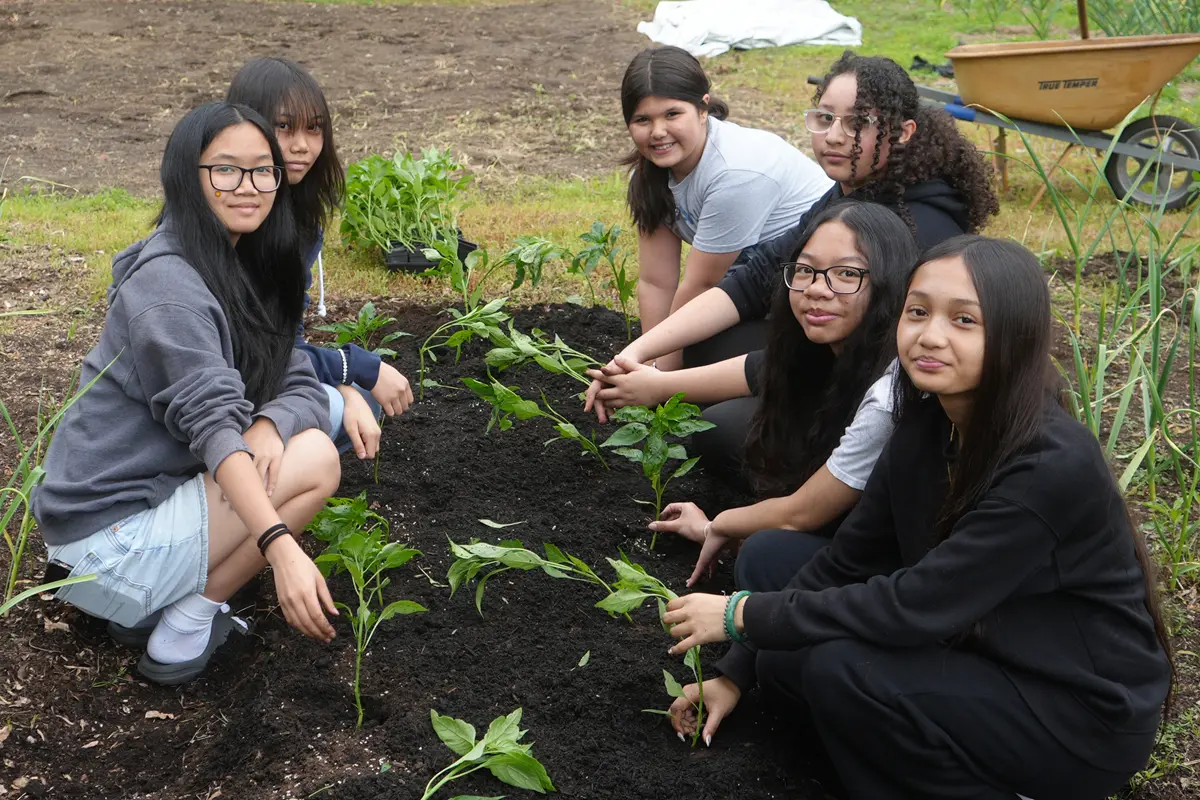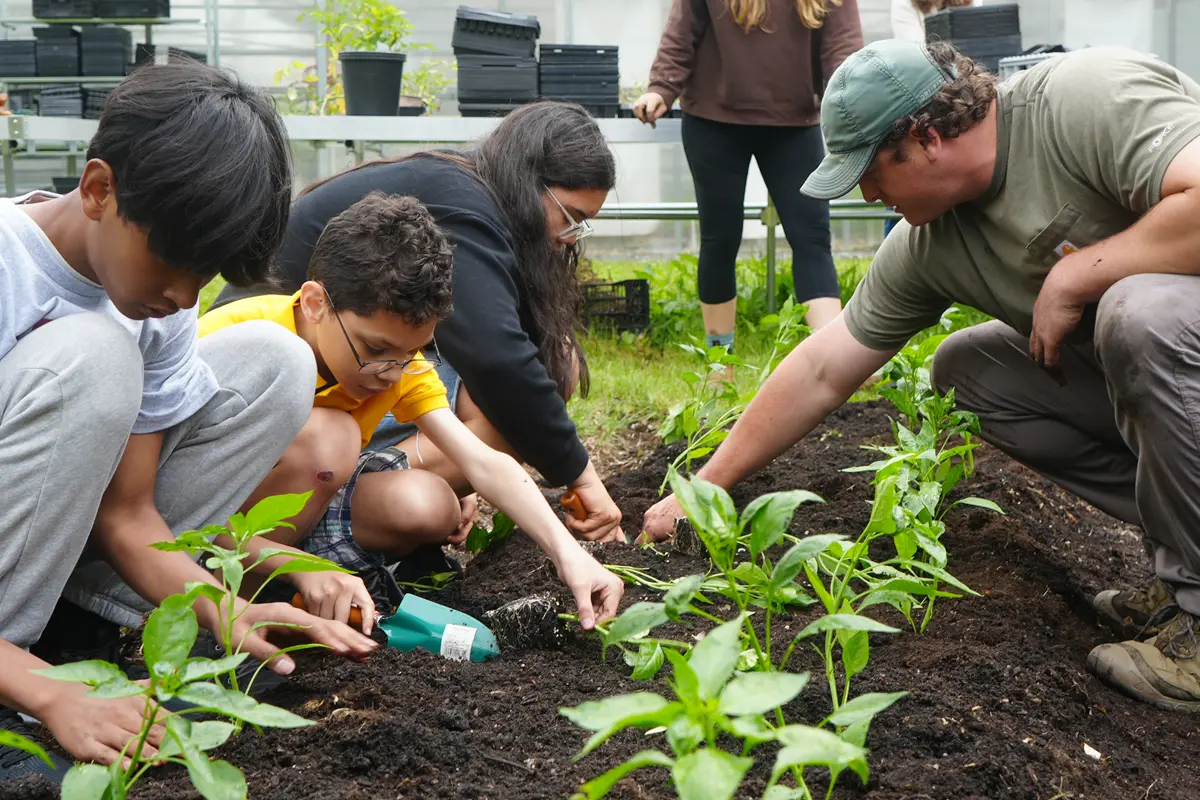Climate Cool Schools Program is One of the First of its Kind in the U.S.
 Image by Brooke Coupal
Image by Brooke Coupal
07/15/2025
Media contacts: Brooke Coupal, communications, economic impact and research development specialist, Brooke_Coupal@uml.edu, and Nancy Cicco, assistant director of media relations, Nancy_Cicco@uml.edu
LOWELL, Mass. – Aleena Ye placed the roots of a shishito pepper plant into a bed of soil at the Rist Urban Agriculture Greenhouse and Farm on UMass Lowell’s campus.
“I’ve never experienced how to garden before,” said the seventh-grade student from Stoklosa Middle School in Lowell.
Ye’s appreciation for plants grew after spending hours at the greenhouse in June as part of Climate Cool Schools, a collaborative initiative led by UMass Lowell and National Grid to advance climate literacy and sustainability in elementary and middle schools. The program is one of the first of its kind within the U.S. and originated from Massachusetts Gov. Maura Healey’s 2023 trip to Ireland, which focused on environmental and climate education and economic development.
"At UMass Lowell, we are committed to empowering the next generation through education, innovation and community partnerships,” said UMass Lowell Chancellor Julie Chen. “The Climate Cool Schools program reflects that mission by bringing together our expertise in climate science and our dedication to public engagement. This collaboration with National Grid not only fosters climate literacy among students and their families but also serves as a model for how universities and industry leaders can work together to create a more sustainable future."
UMass Lowell’s leadership in sustainability is reflected in its platinum rating from the Association for the Advancement of Sustainability in Higher Education’s (AASHE) Sustainability Tracking, Assessment and Rating System (STARS). UMass Lowell is the only higher education institution in Massachusetts, one of eight in the nation and one of 15 in the world to hold the prestigious platinum designation.
“National Grid is proud to partner with UMass Lowell on the Climate Cool Schools initiative, helping to inspire the next generation through hands-on learning,” added Komie Jain, Global Head of Social Impact and Engagement for National Grid. “By supporting educational experiences that connect students to the energy systems that power their daily lives, we are investing in the future of Lowell and building strong, more informed communities.”
 Image by Brooke Coupal
Image by Brooke Coupal
Stoklosa Middle School served as the pilot institution for the Climate Cool Schools program during the 2024-25 academic year. The school has a population of about 625 students, many of whom come from low-income households or identify as high-need students. For the 2025-26 academic year, Climate Cool Schools will expand to five more schools in Lowell, including Butler Middle School, Robinson Middle School, Lincoln Elementary School, McAuliffe Elementary School and STEM Academy.
“The Climate Cool Schools program is a wonderful example of how multiple organizations can work together to create a lasting impact,” said Lowell Superintendent of Schools Liam Skinner. “Not only does this program help the city work toward its sustainability, safety and energy-efficiency goals, but most importantly, it is providing students with educational opportunities in climate and environmental sciences, which many students are very interested in, and giving them an important connection to UMass Lowell. The pilot this past school year was very well received by students and staff at the Stoklosa Middle School, and I am excited to have this program expanded to more Lowell schools in the upcoming year.”
The Climate Cool Schools program is made up of six pillars:
- Engage students with school gardens in collaboration with Mill City Grows, a Lowell nonprofit.
- Ensure that schools have the proper resources — such as grants and physical materials — to provide safe transportation options, including walking, biking and shared transit, in collaboration with the Massachusetts Department of Transportation.
- Conduct regular audits and distribute resources to help participating schools with waste and recycling processes, with assistance from Waste Management.
- Support schools in their progress toward decarbonization while working with the city of Lowell and National Grid to achieve school-specific energy efficiency goals.
- Provide teachers with training and materials to implement sustainability into their lesson plans in conjunction with state curriculum requirements.
- Bring students to UMass Lowell’s campus for a sustainability-focused day of service at the Rist Urban Agriculture Greenhouse and Farm.
Thanks to Climate Cool Schools and its many partners, Stoklosa Middle School’s staff and administrators completed all six pillars — often with the help of students. Stoklosa’s accomplishments included revitalizing the school garden, revamping its recycling system with new signage and student recycling teams, applying for grants for new bike racks and an HVAC system, and conducting an energy efficiency assessment. UMass Lowell faculty ran professional development workshops for teachers that included the handout of materials needed for lesson plans on climate science and sustainability.
Students from Stoklosa came to UMass Lowell’s campus to plant peppers at the Rist Urban Agriculture Greenhouse and Farm and learn about the university’s sustainability efforts. The Climate Cool Schools program also connected Stoklosa families in need with the city of Lowell’s energy advocate, Victor Vargas, to discuss sustainable energy solutions.
“We’re helping schools think about the six pillars in ways that are easily digestible and giving them actionable solutions that they’re capable of sustaining,” said Climate Cool Schools Program Coordinator Madison Feudo ’24, ’25. “We want the schools to move in a positive direction in line with the state’s energy and sustainability goals.”
